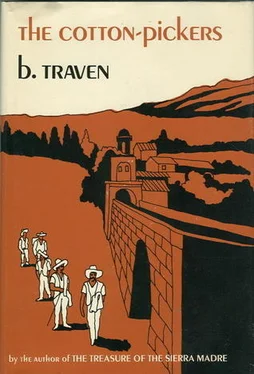B. Traven - The Cotton-Pickers
Здесь есть возможность читать онлайн «B. Traven - The Cotton-Pickers» весь текст электронной книги совершенно бесплатно (целиком полную версию без сокращений). В некоторых случаях можно слушать аудио, скачать через торрент в формате fb2 и присутствует краткое содержание. Год выпуска: 1969, Издательство: Hill and Wang, Жанр: Проза, на английском языке. Описание произведения, (предисловие) а так же отзывы посетителей доступны на портале библиотеки ЛибКат.
- Название:The Cotton-Pickers
- Автор:
- Издательство:Hill and Wang
- Жанр:
- Год:1969
- ISBN:нет данных
- Рейтинг книги:3 / 5. Голосов: 1
-
Избранное:Добавить в избранное
- Отзывы:
-
Ваша оценка:
- 60
- 1
- 2
- 3
- 4
- 5
The Cotton-Pickers: краткое содержание, описание и аннотация
Предлагаем к чтению аннотацию, описание, краткое содержание или предисловие (зависит от того, что написал сам автор книги «The Cotton-Pickers»). Если вы не нашли необходимую информацию о книге — напишите в комментариях, мы постараемся отыскать её.
—Book World
The Cotton-Pickers — читать онлайн бесплатно полную книгу (весь текст) целиком
Ниже представлен текст книги, разбитый по страницам. Система сохранения места последней прочитанной страницы, позволяет с удобством читать онлайн бесплатно книгу «The Cotton-Pickers», без необходимости каждый раз заново искать на чём Вы остановились. Поставьте закладку, и сможете в любой момент перейти на страницу, на которой закончили чтение.
Интервал:
Закладка:
The Yugoslav was standing hesitantly inside the café while this discussion was going on.
Meanwhile a crowd of people had gathered, all of whom seemed to side with the waiters. It was partly their show of sympathy that had emboldened the policeman who was, after all, a wage earner himself. He could never be sure, however, that Doux hadn’t a close friend among the police inspectors who might accuse him of neglecting his duty.
After the policeman left, the Yugoslav took off his white jacket and went over to the counter to get his day’s pay. Señor Doux asked him what it was all about, why he wanted to leave. The man couldn’t answer, but tried to explain with eloquent gestures that his buddy had got one over the head with a club
and that he didn’t want the same to happen to him. Outside, the pickets and passers-by were following the demonstration of primeval sign language with evident enjoyment. Doux tried to make the Yugoslav understand that he would be absolutely safe if he stayed in the café. But the poor man wouldn’t accept Doux’s assurance.
Had he been more familiar with the country’s ways he would have known that he was safe at no time in any place, that he couldn’t stay within four walls forever, and that all would be up with him the moment he walked out. For his face was already well known to every worker in town, and there was no need for a photograph or a poster. Even the four walls of the café were no shelter, for some day, the next day or the day after, somebody might walk into the café, give an order to him, and when he brought it give him such a blow on the head with a bottle that an ambulance would have to come and collect him. And before anyone in the café realized what had happened, the avenger would be several blocks away. No one, not even a star detective, would find him.
That is why there were few scabs in the Republic; it was well known that effective measures were taken against them. War is war, and the workers were determined to wage war until they had won not just one battle but the whole campaign. States at war permit themselves the use of any weapon, so why shouldn’t the workers in their war? Workers usually make the mistake of wanting to be regarded as respectable citizens, but no one thinks the better of them for it.
Of course, Señor Doux cheated the Yugoslav out of his scab’s pay, giving him only fifty centavos and charging him forty for a broken tumbler. After collecting his pay, he approached the doorway and looked out at the striking waiters. As he stood there in his shirtsleeves, which were little more than filthy rags, the pickets saw the wretched man for what he really was. When he finally took courage and came out of the café, one of the pickets promptly took him in charge, accompanied him to the union office, found him a place to stay for the night, and promised to get him a job in a tin works.
Something entirely different happened to the Italian. On the following morning he was brought before the Police Superintendent, who, instead of commending him for his loyal scabbing, asked to see his immigration certificate.
“I haven’t got one,” he answered through an interpreter. “How did you get into this country?”
“On a ship.”
“Oh, so you deserted from a ship.”
“No, I was paid off.”
“Oh, yes, we know all about that sort of paying off. So we’re going to hand you over to your Consul with the understanding that he send you back to Italy on the next ship. You’re a troublemaker, and we’ve no room for such as you here.”
A police officer took him to the Consul who, from that moment, would be responsible for him and maintain him until he could be shipped back to his country.
“What sort of mischief have you been up to, stealing?” the Consul asked.
“No. I was working as a waiter in the Aurora until I got one over the head.”
“But there’s a strike on at the Aurora. Didn’t you know that?”
“Sure. Otherwise I wouldn’t have gotten the job as a waiter. I’m a carpenter, really.”
“Look here, my man, this Republic has a workers’ government. Scabs are not popular here. So you see your activities in this country have come to an end. And don’t try to bolt out of here, for I’ll catch you and have you arraigned. You’re now under my authority; I’ve put up bail for you so that you won’t have to wait in jail until you can be shipped home. The jails here are no joke, you know. They’re a serious business, and at least you’re saved from them. So behave yourself.”
Two days later he was deported to the country of his origin on the grounds that he had entered the Republic illegally.
And that was how the matter of the scabs at the Aurora was settled.
There were a few loyal customers who continued to come to the café, and these were served by Doux and his wife; but that couldn’t be called business. There was not much for us to do in the bakery either, apart from outside orders to be filled.
One afternoon there were six or eight customers in the place, including a police inspector called Lamas. He patronized the Aurora regularly, afternoons and evenings, and ran up quite a bill, which he was always going to pay “manana.” Although he was married and had two children, he also had two mistresses to support; thus he was always in debt. Now he sat among the guests who were having their ice creams and sipping their drinks; at one table a game of dominoes was in progress, at another one of cards.
In some countries pickets are respectable law-abiding citizens who believe in authority. They don’t talk much, and when a policeman says, “Stand back! You’re blocking traffic!” they move at once, as if the police paid them and not the other way around.
In Mexico, the workers were more or less undisciplined and the union secretaries were obliged to go along with the actions of the rank and file. The remarkable thing was that they won practically every strike.
“Hey, you,” a picket called out to one of the customers, “don’t eat that ice. It’s only sugar and water, there’s not a spoonful of cream in it. The pig wants to make as much out of your portion as he would if there were no strike.”
But the customer, obviously a friend of Doux’s, called out: “Are you paying for this ice or am I? — you dirty clod!”
“You’d better watch out, you filthy scab, that I don’t get rid of you,” said the picket, amid loud laughter from outside.
One of the customers had a lady with him who was drinking fruit juice through a straw. “Is she still a virgin?” another picket shouted in. “Hurry up, fellow, before some other man gets in first.”
The lady went on sipping her drink as if she had heard nothing, but her escort shouted back: “Shut up, you son-of-a-bitch! It’s none of your business.”
At this point Doux went to the door and said: “You’re not to annoy my guests. Shut up and leave my guests alone!”
“Guests? They’re not guests. They’re a lot of lousy pimps,” shouted the pickets, joined by a group of youths who were hanging about. “Pay a decent wage and give proper food, or we’ll tear the hide off you. And you’d better be quick about it, else we’ll make things hum for you.”
Inspector Lamas then went to the door, feeling that it was up to him to do something for the credit he enjoyed. The previous week he had ordered a twenty-five-peso cake with the name Adela inscribed on it in green icing. Adela was one of his two mistresses, and the cake was for her birthday. Lamas had come right into the bakehouse and had specially requested that the cake be decorated with rose garlands. He still owed for the cake too.
He stood in the doorway and listened to the interchange. Then without a word he pulled out his revolver and with the butt end struck the picket who was standing nearest such a blow on the head that the blood spurted out. Then he whistled. Two policemen came up and he ordered them to conduct all the pickets and a few bystanders to the police station.
Читать дальшеИнтервал:
Закладка:
Похожие книги на «The Cotton-Pickers»
Представляем Вашему вниманию похожие книги на «The Cotton-Pickers» списком для выбора. Мы отобрали схожую по названию и смыслу литературу в надежде предоставить читателям больше вариантов отыскать новые, интересные, ещё непрочитанные произведения.
Обсуждение, отзывы о книге «The Cotton-Pickers» и просто собственные мнения читателей. Оставьте ваши комментарии, напишите, что Вы думаете о произведении, его смысле или главных героях. Укажите что конкретно понравилось, а что нет, и почему Вы так считаете.











